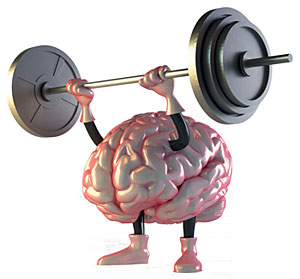 Latest research on how to delay the effects of aging on your brain READ MORE....
Latest research on how to delay the effects of aging on your brain READ MORE....
by Richard A. Friedman, professor of clinical psychiatry at Weill Cornell Medical College, N Y Times, October 25, 2015
“…there is no evidence that any prescription drug or supplement or smart drink is going to raise your I.Q.”
According to professor Friedman, “The very notion of cognitive enhancement is seductive and plausible. After all, the brain is capable of change and learning at all ages. Our brain has remarkable neuroplasticity; that is, it can remodel and change itself in response to various experiences and injuries. So can it be trained to enhance its own cognitive prowess?
“The multibillion-dollar brain training industry certainly thinks so and claims that you can increase your memory, attention and reasoning just by playing various mental games. In other words, use your brain in the right way and you’ll get smarter.”
Friedman cites a study by BBC and Cambridge University neuroscientists who tested 11,430 people in popular “brain training.” Ah that I had a fraction of the bazillions paid for Lumosity, etc. The scientists asked, ‘Do brain gymnastics actually make you smarter, or do they just make you better at doing a specific task?’ That is, can you actually transfer what you learn from playing a math game or puzzle to other problems? The short answer: No. However, for people 60 and older, their ability in verbal reasoning improved significantly. This is great news for Baby Boomers who are wildly seeking to delay some of the effect of aging – the hippocampus which stores our memories declines 1 to 2% per year – by doing new things that actually work to talk through issues and problems.
Major Findings:
- Women who did aerobic exercise improved in verbal memory, those who did resistance training and aerobic exercise improved in spatial memory. Those who did weight training twice a week for a year had less brain shrinkage than those who trained once a week or did stretching exercises.
- Anti-depressants block the effects of depression on shrinkage of the brain.
The only consistent effect of stimulants (Adderall or Ritalin) :which increase focus and make the world feel more interesting by releasing more dopamine” while taking them, is to consolidate long-term memory, “meaning that they strengthen the ability to recall previously learned information—an effect that might confer some advantage in the real world.” - There is strong epidemiologic (the study of patterns, causes, and effects of health and disease in populations that define policy decisions based on evidence-based practice) [A GREAT new word to throw around at parties] evidence that people with richer social networks and engagement have a reduced rate of cognitive decline as they age. And by social networks they mean face-to-face interactions with family, friends and other social groups.
- Another study was performed with low-performing seventh graders. One group was told that “learning changes the brain and that students are in charge of this process,” the other group was given a lesson on memory. At the end of 8 weeks, the first group scored significantly better on a test of material that both groups were given during the seminar. These findings have “profound implications for educating young people because they suggest that…teachers encouraging their students to think of their own cognitive capacity as a quality that they can improve can have a powerful effect: enhancing learning and motivation.”
And so the premises of BrainStyles™ come to the fore: Learning the limitless potential of your brain-based gifts opens up a vast territory to explore for all your life. Add to that the bonus of socializing with appreciation for others’ gifts that can expand the people you meet and get along with is another way to keep your brain and your body healthier. And on top of that, finding friends to exercise with is the very best way to lock in those benefits.
As Friedman concludes, “In the end, you can’t yet exceed your innate intelligence. But that seems less important than the fact that there is much that you can do to reach your cognitive potential and to keep it. Forget the smart drugs and supplements; put on your shorts and go exercise. If you’re 60 and up, consider brain training. And do it all with your friends.”
- To gild the lily here, Harvard Professor of the most popular class at Harvard, Shawn Achor, defines happiness as “the joy you feel when seeking to reach your highest potential.” (The Happiness Advantage: The Seven Principles of Positive Psychology That Fuel Success and Performance at Work, © Crown Publishing, 2010) His findings: “ Happiness fuels success, not the other way around. When we are positive, our brains become more engaged, creative, motivated, energetic, resilient, and productive at work. This isn’t just an empty mantra. This discovery has been repeatedly borne out by rigorous research in psychology and neuroscience, management studies, and the bottom lines of organizations around the globe.”
And to that we must add, Happiness can be defined as the joy, the “flow” of being in “the zone” when doing what is easiest and most natural for you to do in your brainstyle.



